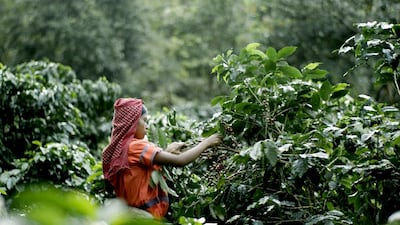Dubai had a rare cinematic treat recently when one of the biggest names in global documentary filmmaking flew into town for a pair of exclusive screenings and Q&A sessions at The Scene Club for her latest film, A Small Section of the World.
Lesley Chilcott's name may not be as recognisable as the likes of Michael Moore or Morgan Spurlock, but as a producer on Davis Guggenheim's An Inconvenient Truth, Waiting for "Superman" and It Might Get Loud – all of which sit proudly among the top 100 grossing documentaries of all time – she is well-known.
A Small Section of the World marks Chilcott's feature-length directorial debut, and she was in Dubai courtesy of OSN and the Sundance Channel to screen the movie ahead of its regional television premiere, alongside It Might Get Loud, on Sundance on February 7.
A Small Section of the World tells the story of a group of Costa Rican women who revolutionised the coffee industry when they set up a women's coffee-producing collective following the departure of their husbands and sons to look for work in cities or neighbouring countries after the price of coffee collapsed in the mid 1990s.
Chilcott and her husband own a farm in Costa Rica but were completely unaware of La Asociación de Mujeres Organizadas de Biolley / The Organized Women’s Association of Biolley (Asomobi) until an unlikely chain of events was set in motion by the Italian coffee giant Illy.
“No one in Costa Rica has even heard of Biolley,” says Chilcott. “You just have to say it’s in the Talamanca Mountains. That just shows how remote it is. It’s just a tiny coffee mill on top of a hill. I have to admit that the story really did come to me.
“Illy is one of few coffee companies that sends agronomists out to the field, and one came back telling them about these amazing women they’d been buying coffee from. Illy is a big contributor to the arts in Europe and wanted to make a film about it, so they contacted a production company in Los Angeles, GreenLight.”
Red lights begin to flash when Chilcott mentions the involvement of Illy – coffee companies are not known for their social responsibility – but having watched the film, it’s safe to say this is far from a piece of corporate marketing.
“It was a surprise to me,” says Chilcott. “As a serious documentary producer, I was immediately: ‘I can’t make a branded documentary’. But they insisted they wanted me to tell the story I wanted to tell. I had final cut, which meant a lot to me, and they let me put all sorts in there about fair prices for farmers, price volatility and so on.”
Once Chilcott agreed to take on the project, she immediately embarked on an exhaustive study of the history and politics of coffee, which, as a tea drinker, she felt was crucial to the film.
But more importantly, she learnt that following a major crisis, when the cost of producing coffee outstripped the price of selling it in the 90s, the women and children of Biolley found themselves essentially abandoned in a region with no industry other than coffee.
The movie charts the women’s attempts, starting in 1997, to convince farmers to let them use their land, to build their own roasters, then build their own mill and, ultimately, after many years and failed attempts, succeed in producing high-end coffee that was able to rise above the continuing slump in prices.
The Costa Rican model has now spread far and wide.
“As you see in the film, Asomobi was the first women’s micro mill in Costa Rica,” says Chilcott. “There are others now, and through a group called the International Women’s Coffee Alliance the story has spread to women in Burundi, in Kenya, in Uganda. They’re all following the Asomobi model.”
• A Small Section of the World will debut on the Sundance Channel, exclusively available through OSN, on February 7. The movie is available on major video on demand channels, including iTunes, Google Play and Amazon Instant
cnewbould@thenational.ae

